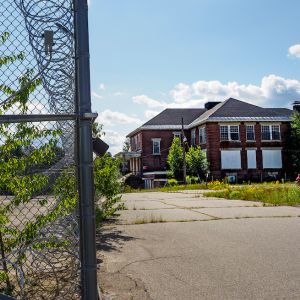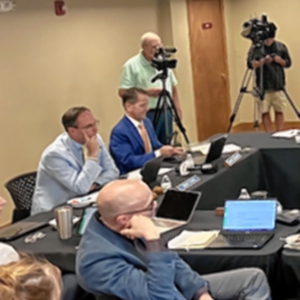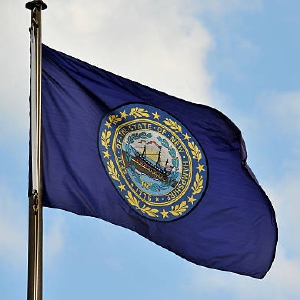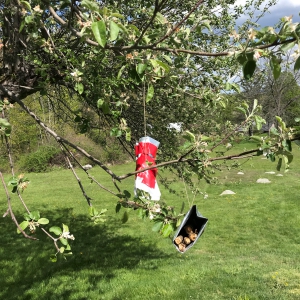Opinion: Serving our neighbors
| Published: 03-23-2023 6:00 AM |
Brinkley Brown of Concord is a Peace Corps volunteer currently serving as an English teacher in Rwanda.
A few years ago, I attended a forum about public service at home and abroad. At the time, the forum had little connection to my life as a sophomore in college. I was occupied with studies and extracurriculars, a burgeoning social life, boys. Only recently have I thought about this event and its connection to my life today.
In particular, I’ve thought about a couple of questions that someone in the audience asked the speakers: What do you think about mandatory public service? How might mandatory service change our country?
Unfortunately, the speakers’ responses escape me. As a Peace Corps volunteer, public service is something I firmly believe in. I’ve been abroad now for ten months, serving as an English teacher in rural Rwanda.
I love my work. It’s fulfilling, enriching, and meaningful. At the same time, I know Peace Corps is not for everyone. Back in the late 80s, it was coined “the toughest job you’ll ever love” on print advertisements. It was my choice to apply to Peace Corps and, after that, it was my choice to serve after getting an offer.
The key word here is choice. I chose to serve because this was where I believed my background, skills, and values could best meet the social, political, and economic moment in 2021. Mandatory public service, in my eyes, is the wrong question.
Here in Rwanda, there is a mandatory service requirement. It’s called umuganda. Umuganda is a nationwide day of community service held on the last Saturday of every month. It was instituted to promote reconciliation and recovery following the Genocide Against the Tutsis in 1994.
By law, all citizens age 18 to 65 are expected to participate. The actual service varies from village to village; some may sweep streets while others terrace mountainsides to control erosion. Each month, local leaders gather to decide what community need their village is going to address.
Article continues after...
Yesterday's Most Read Articles
 No deal. Laconia buyer misses deadline, state is out $21.5 million.
No deal. Laconia buyer misses deadline, state is out $21.5 million.
 “It’s beautiful” – Eight people experiencing homelessness to move into Pleasant Street apartments
“It’s beautiful” – Eight people experiencing homelessness to move into Pleasant Street apartments
 With Concord down to one movie theater, is there a future to cinema-going?
With Concord down to one movie theater, is there a future to cinema-going?
 Quickly extinguished fire leaves Concord man in critical condition
Quickly extinguished fire leaves Concord man in critical condition
 Concord police ask for help in identifying person of interest in incidents of cars being keyed during Republican Party event
Concord police ask for help in identifying person of interest in incidents of cars being keyed during Republican Party event
My first umuganda was last July. On this day, neighbors came together with hoes, machetes, and shovels to begin clearing a three-mile stretch of savannah that would eventually become a road. This road would lead to a school that currently lacks a functional thoroughfare. Over the course of a few hours, we cleared about half a mile of brush, grasses, and small trees.
A couple of months later, umuganda was spent assisting an elderly woman to build a new house. Again, neighbors assembled with their tools ready to work, this time, mixing earth, straw, and water, and molding the mixture into mud bricks. About half a dozen people mixed, two dozen carted over raw materials, three dozen formed an assembly line between the mixing pit and molding station, and another dozen took turns molding bricks.
Standing calf-deep in the mixing pit, stomping on wet earth and straw is a feeling I’ll never forget. The mud was so dense and thick, I was sure I had suction cups for feet. By noontime, we had made enough bricks to form the base of the modest-sized home.
The most recent umuganda took place at the school where I teach. Over three hundred students and teachers worked together to spruce up the place. We carted away stray boulders, burned rubbish, weeded walkways, planted grass, washed windows, and mopped classrooms. By late morning, not a stone was out of place. Our campus was so impeccable, you’d think one of those home improvement shows on reality television had come in and transformed the school.
As an outsider, it has been my experience that the ethos of service is so part and parcel of Rwandan culture that folks would serve one another regardless of the monthly requirement. Here, serving others is so deeply a part of the citizenry that behaving otherwise is like driving on the left side of the road and walking with your shoelaces untied. In this way, service is less of a conscious choice and more of an instinctual one.
Let us foster this culture of service in America. Let us focus less on whether service could or should be mandatory, and more on cultivating a serving instinct. Let us strive to make collectivism, giving back, and giving to this generation’s defining zeitgeist. In whatever capacity we are able, let us serve our neighbors down the street, on the street, and abroad.
Where to start? Think of public service every time you lace up your shoes.
]]>


 Opinion: Public school standards overhaul will impact every facet of public education in NH
Opinion: Public school standards overhaul will impact every facet of public education in NH Opinion: A bad idea for New Hampshire
Opinion: A bad idea for New Hampshire Opinion: Medical Aid in Dying would have spared my father’s suffering
Opinion: Medical Aid in Dying would have spared my father’s suffering Opinion: NH youth’s effort for a more robust climate curriculum
Opinion: NH youth’s effort for a more robust climate curriculum
